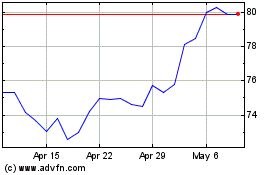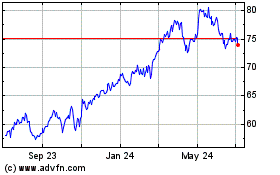From MetLife to Prudential, Insurance Stocks Are Reeling Today
February 11 2016 - 1:46PM
Dow Jones News
By Leslie Scism
Life-insurance stocks fell sharply again Thursday as worries
mount about the pain of plunging oil prices and the possibility
that low interest rates won't go away as fast as expected.
Prudential Financial Inc. was among the hardest hit, down more
than 10% a day after it reported disappointing fourth-quarter
earnings. Operating earnings declined 12% and the Newark,
N.J.-based company missed Wall Street expectations because of weak
investment income and higher expenses.
Shares of Lincoln National Corp., another life insurer, fell
more than 9% in early afternoon trading. MetLife Inc. was down
nearly 5%.
Rising rates are good for Prudential and other large insurers
because they tend to invest the premiums paid by individuals and
businesses in high-quality corporate bonds as a way of generating
income until claims come due.
The fear among insurance investors is that the Federal Reserve
won't follow through on its desire to gradually raise interest
rates this year because of concerns about global economic growth.
That means the pressure on insurers' investment income could
remain--potentially for years.
The latest declines leave Prudential down 21% through
Wednesday's close, worse than the 9.4% decline in the S&P 500
through the same period. Lincoln National Corp. was down 31.8%
through Wednesday, MetLife Inc. was down 23.5% and American
International Group Inc. was down 15.4%.
Interest rates aren't the only factor driving shares lower.
Insurers also are reeling from depressed oil prices and a troubled
energy industry. Fitch Ratings estimates that U.S. life insurers
face $3 billion to $4 billion of energy-related corporate bond
losses in 2016, or about 5% of industry statutory earnings and 1%
of statutory capital.
"While U.S. life insurers are relatively well-positioned to ride
out the oil slump, in a 'lower for longer' oil price scenario,
insurers may be more susceptible to ratings downgrades if energy
contagion spills into other asset classes," said Doug Meyer, a
managing director at Fitch.
Another problem is that many insurers over the last decade have
increased their reliance on retirement-income savings products that
are tied to market performance. These products, known as variable
annuities, are a tax-advantaged way for consumers to invest in
stock funds. Insurers earn fees based on the invested amounts, so
in a down market they earn less, as with the mutual funds some sell
in their asset-management units.
Variable annuities also typically are sold with lifetime-income
guarantees, and those guarantees are costlier for life insurers to
provide when interest rates are low.
The release of Prudential's earnings Wednesday prompted some
Wall Street analysts to reduce their expectations for the insurer
in 2016. Morgan Stanley knocked 40 cents off its 2016
earnings-per-share estimate, to $9.70, because of "current market
conditions," it said.
Prudential's weak results followed a disappointing
fourth-quarter earnings report last week by MetLife, the nation's
biggest life insurer by assets. MetLife became the latest insurer
to cite faltering performance of private-equity and hedge funds as
a factor in its earnings, which were below Wall Street expectations
as the company reported weaker profit margins in many of its core
operations.
Write to Leslie Scism at leslie.scism@wsj.com
(END) Dow Jones Newswires
February 11, 2016 13:31 ET (18:31 GMT)
Copyright (c) 2016 Dow Jones & Company, Inc.
American (NYSE:AIG)
Historical Stock Chart
From Mar 2024 to Apr 2024

American (NYSE:AIG)
Historical Stock Chart
From Apr 2023 to Apr 2024
